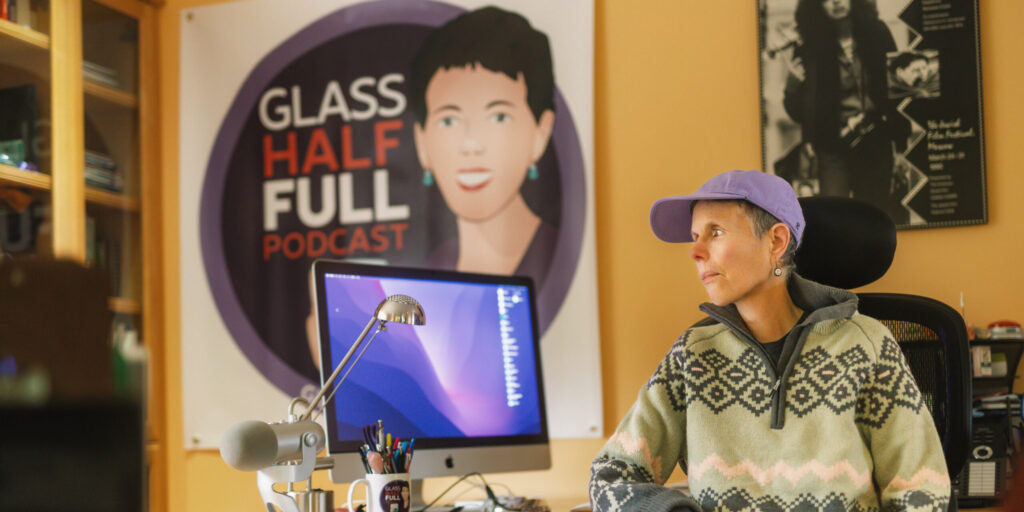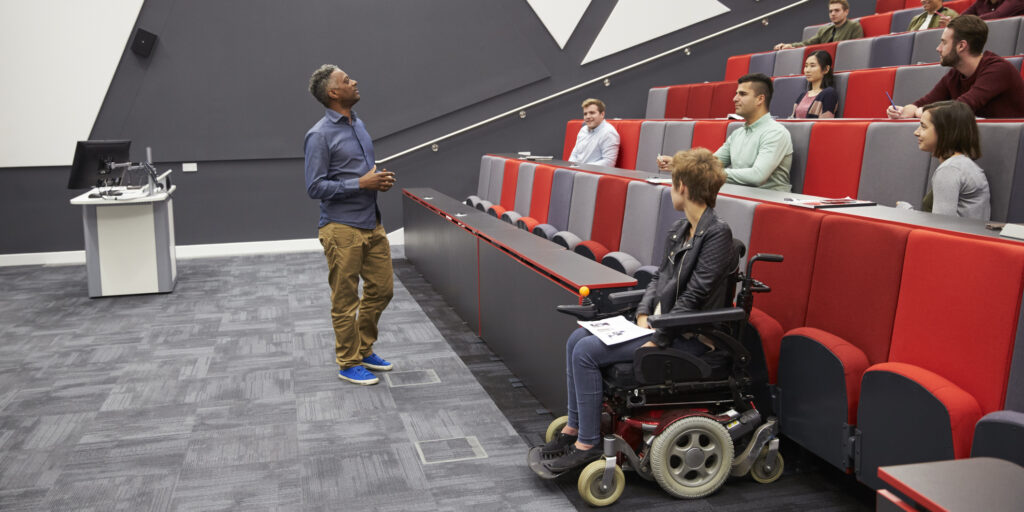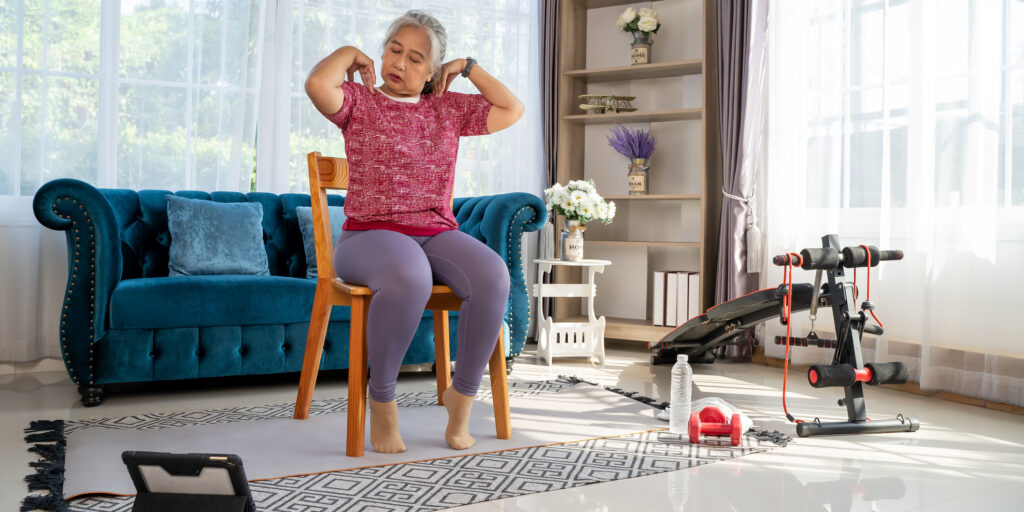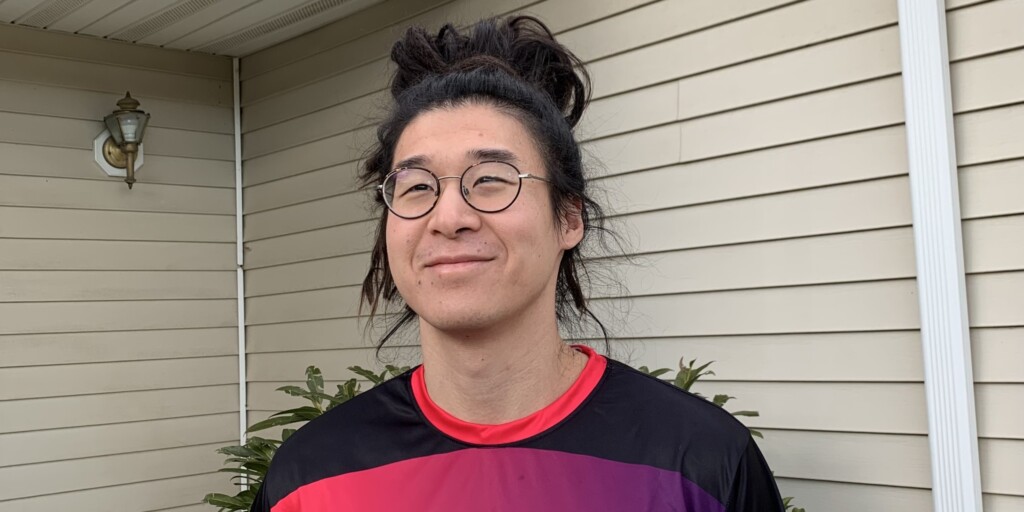
MDA Let’s Play Community Spotlight: NegaGrier
By Jeff Shaw | Friday, January 29, 2021
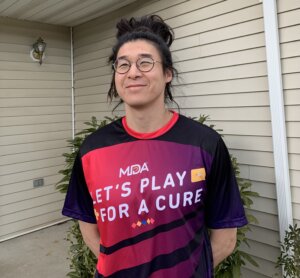
Jeff Shaw
[Image description: A young man with long black hair pulled into a top bun wears round, black wire-rimmed glasses and a colorful black-and-red shirt reading “MDA Let’s Play for a Cure.”]
Jeff Shaw, program manager for MDA Let’s Play, MDA’s online gaming and streaming community, is part of a team that leads Saturday Game Nights on Twitch, celebrity streamer events for MDA, tournaments with great teams and players, and steadfast support and discussion on the MDA Let’s Play Discord server channel.
Among our many great friends in the MDA Let’s Play community is 27-year-old Eric Grier (screen name NegaGrier), a professional chef, popular musician, streamer, and lifelong gamer from Ontario, Canada, who lives with fascioscapulohumeral muscular dystrophy (FSHD). Jeff had a chance to ask Eric about his experiences with MDA Let’s Play, and this is what Eric had to say.
Can you tell us a little about your journey with FSHD?
Ever since I was a kid, I noticed that my shoulder blades winged out a lot more than other kids’ did. After high school, I worked in a factory for a year before earning my Culinary Management diploma from George Brown College. [At work in the factory,] I started noticing that when I would raise my arms in the air, I had trouble controlling them when I pushed them back down to about shoulder height. I went to doctors, physiotherapists; no one knew what it could have been. My family doctor referred me to a doctor who specializes in neuromuscular disorders at McMaster University Medical Center [in Hamilton, Ontario]. We went to see him and he had it right from the beginning that it was FSHD, but he wanted to make sure, of course.
This particular muscular dystrophy, like the name suggests, affects the face, scapula, and arm muscles. After some basic strength testing, I had my blood tested. It was then it was confirmed that I had FSHD type 2. This was three years after the initial point where I noticed my arms having the feeling that something was pushing them down.
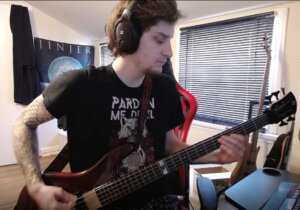
Eric Grier, aka NegaGrier.
[Image description: A young white man with shaggy blonde hair, wearing headphones and a black T-shirt with white writing on the front, plays a guitar.]
The doctor from McMaster then referred me to a doctor at a hospital in London, Ontario, who specializes in a procedure known as a scapulothoracic fusion, a procedure in which a metal brace is placed on the shoulder blade. Holes were drilled in the brace and a very strong wire was wrapped around my rib cage in the back to fuse it in place. The brace keeps my shoulder blade in place where it should be, allowing me to raise my arm in the air without the feeling of something pushing it back down. I had this procedure done on both of my shoulder blades; did the right one in October 2016 and the left one in January 2018.
How did you start gaming?
I’ve been playing video games longer than I can remember. My earliest memories of gaming were playing Super Mario Kart with my brother. I grew up a Nintendo kid, going through all the various Nintendo consoles including Game Boys and the GameCube, playing games like Pokemon, Kirby, Mario, Super Mario 2: Yoshi’s Island — you name it. So, in short, I have been playing for the majority of my life. Later in my childhood, it was all about the Xbox and later Xbox 360; I was obsessed with the first Halo game. I played Rock Band almost every day throughout high school, even scoring some of the top scores on the leaderboards for Expert Drums and Expert Pro Drums. I built my first PC with my uncle and have been a PC gamer ever since. These days, I love to play Rocksmith 2014, Smite with friends, and Hades.
Why is the gaming community important to people living with neuromuscular disease?
The gaming community is extremely important for people living with a neuromuscular disease. Video games are a great way to just relax, roleplay, and be social with friends, which helps distract you from the other things in life. I personally believe video games are great for releasing endorphins as well!
How does gaming impact cause fundraising awareness for a global audience?
Gaming is huge right now. There are so many different streaming services for TV shows and movies, and there are streaming services for video games. Twitch is the biggest example I can think of. These video game streaming websites have people from all walks of life, streaming to 10 to 100 to 1,000 to tens of thousands of people every day. The biggest example I can give is the Games Done Quick community, which streams two different events every year — one in the winter and one in the summer — to raise money for charity. In the last two years, the events have raised more than $2 million, which is absolutely insane when you think about it because it’s just a bunch of regular people just playing video games. The number of individual people also doing charity streams to their own audiences is astronomical as well. I’m so happy that so many celebrities and streamers are stepping up to help MDA.
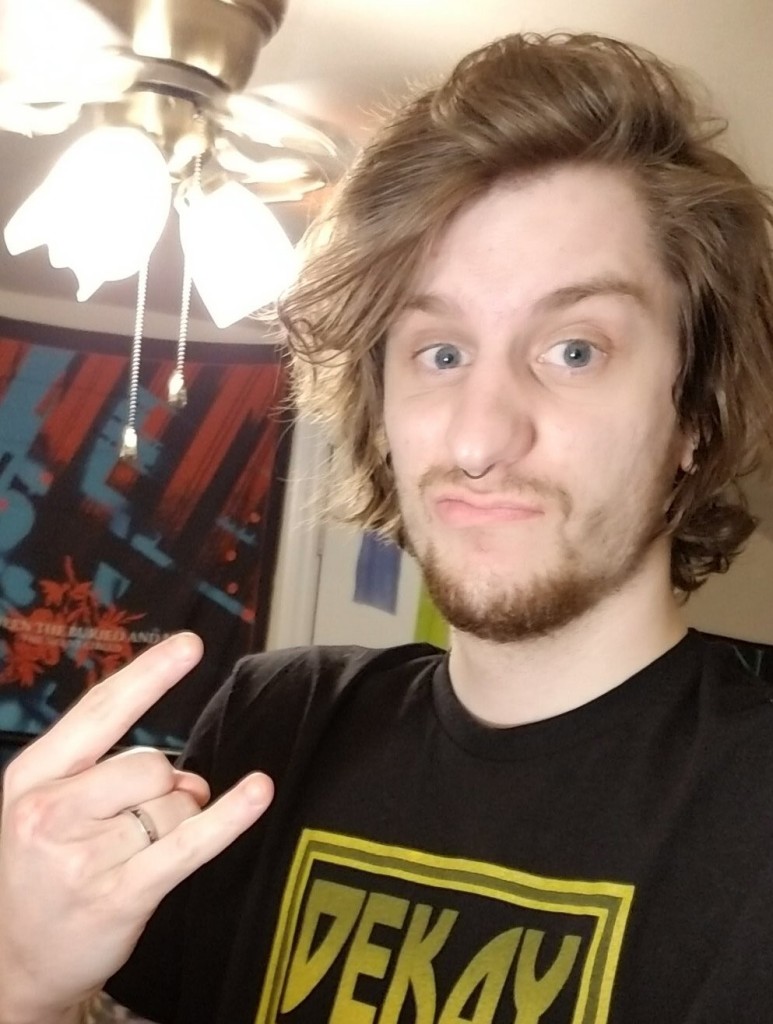
Eric Grier.
[Image description: A young white man with shaggy blonde hair makes the rock ‘n’ roll hand sign.]
Why is it important to game for good and support the mission of MDA to find treatments and cures?
The MDA Let’s Play community, our Game Nights, and all these various charity streams and streamers do help out so much. Neuromuscular disease needs the attention and support that streamers can provide because these are diseases that affect so many people and do not have cures as of right now. This money can be used to help out so many people, and, in the long run, I hope, find cures. I have been living with FSHD my whole life, not knowing it until I turned 20. I wouldn’t wish this disease on my worst enemy. And I think about those who have other types of muscular dystrophy, not making it to their 25th birthdays. It’s heartbreaking, and I just hope one day this can all be something of the past.
Where did your passion for music start, and what are your current goals with playing music to an audience and streaming?
My passion for music started early. I always had music going on in the background, in my ears, from video games, you name it. A couple of years before high school, I decided to pick up the bass guitar and played a lot of Pink Floyd, Queen, and other tunes for school assemblies and pep rallies. Around the beginning of the COVID-19 quarantine back in April 2020, I started finding other people playing music on Twitch and I started getting involved in these communities. I even met my now very best friend in the world thanks to streaming, after finding out he lived not too far from me and bonded over having been to at least two of the same concerts before we ever even met. As far as goals for streaming, I hope to one day make this my main source of income, as well as making my own music one day and possibly forming a band with some of the people I’ve met through streaming. I know this is something I can do for the rest of my life and be truly happy.
Come join NegaGrier and the MDA community for a special Game Night on Saturday, Feb. 6. He will be joining us for a night of fun, games, and music! You can also catch NegaGrier streaming live at https://www.twitch.tv/negagrier or follow his Twitter at https://twitter.com/NegaGrier.
To learn more about MDA Let’s Play fundraising, visit our website.
To join our MDA Let’s Play community, join our Discord.
To play along on MDA Game Nights, follow us on Twitch.
TAGS: College, Education, Employment, Fundraising, Let's Play, MDA Q and A, Relationships
TYPE: Blog Post
Disclaimer: No content on this site should ever be used as a substitute for direct medical advice from your doctor or other qualified clinician.


